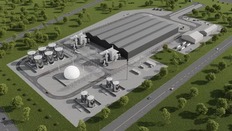- The facility in Germany will recycle 120KTA of plastic by 2025.
- The project targets a final investment decision by the end of 2023.
- The collaboration aims to add 600KTA of recycling capacity by 2030.
- Mura's HydroPRS process converts plastics back into original oils and chemicals.

Project Overview
Mura Technology plans to build a new advanced recycling facility at Dow’s Böhlen site in Germany. This facility is part of a broader initiative to scale advanced recycling of plastics across the U.S. and Europe. The project is expected to reach a final investment decision by the end of 2023.
Recycling Capacity
The Böhlen facility aims to be operational by 2025, delivering approximately 120 kilotons per annum (KTA) of advanced recycling capacity. Collectively, the planned units across Europe and the U.S. are expected to add up to 600KTA of advanced recycling capacity by 2030.
Technological Innovation
Mura’s HydroPRS™ (Hydrothermal Plastic Recycling Solution) process uses supercritical steam to convert various forms of plastics, including previously unrecyclable flexible and multi-layer plastics, back into their original oils and chemicals. This process allows the same material to be recycled repeatedly, reducing reliance on virgin fossil-based feedstocks and preventing plastic waste from going to landfill or incineration.
Environmental Impact
The advanced recycling process is expected to save approximately 1.5 tons of carbon dioxide per ton of plastic recycled compared to incineration. The co-location of Mura’s facilities at Dow sites is anticipated to reduce carbon emissions by minimizing transportation and converting gas output back into plastics, ensuring no by-products go to waste.
Strategic Collaboration
This project builds on Dow and Mura’s ongoing collaboration, first announced in 2021, with an initial project in Teesside, UK. The Böhlen site will significantly increase the supply of fully circular feedstock to the industry, supporting the production of recycled plastics in high demand for applications like food and medical packaging.

